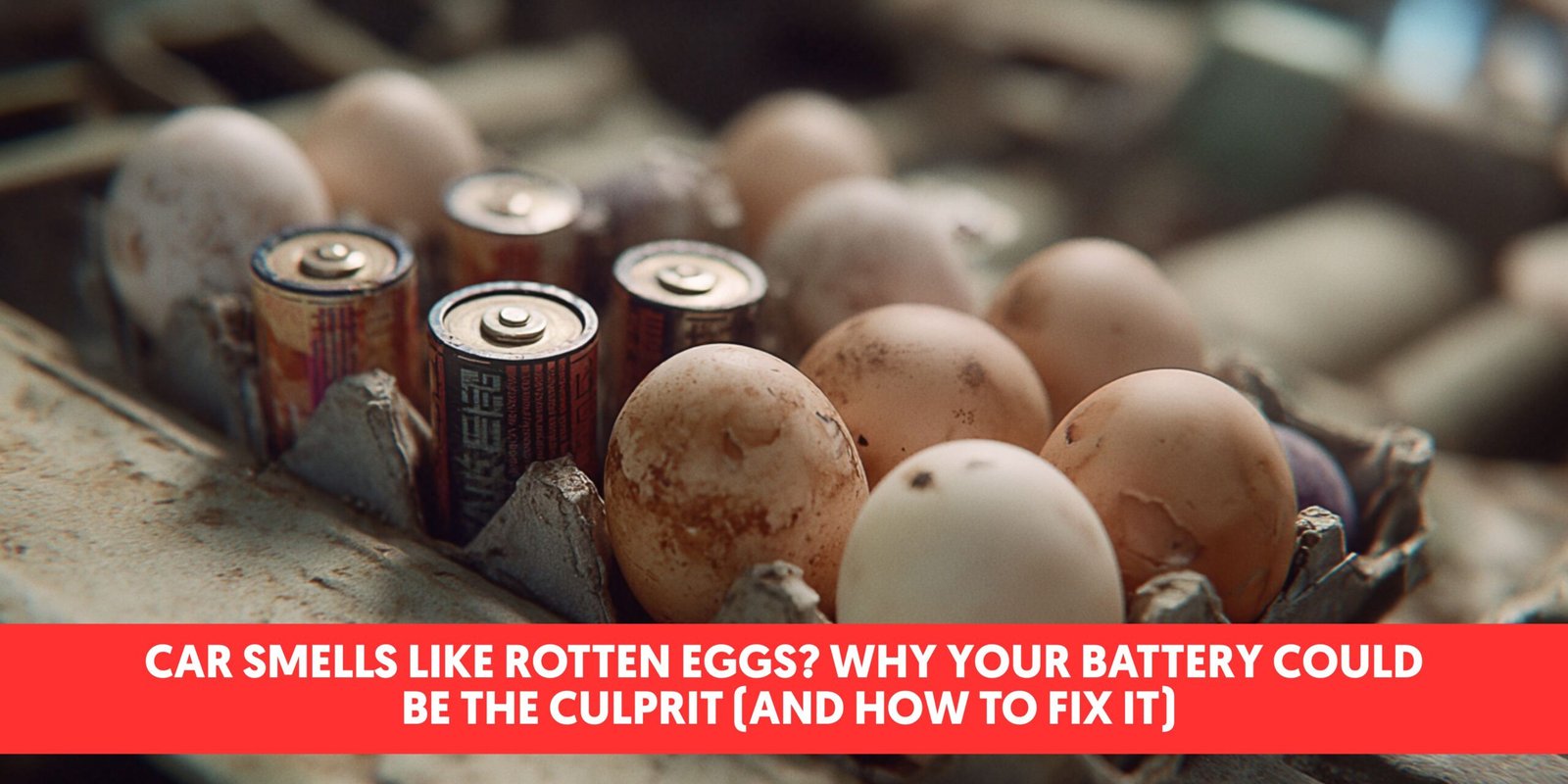Is your car emitting that unmistakable rotten egg smell? This sulfurous odor often signals a battery issue that shouldn’t be ignored. When your vehicle starts to smell like rotten eggs, it’s typically related to hydrogen sulfide gas escaping from a malfunctioning battery or catalytic converter.
Understanding why your car smells like rotten eggs is crucial for both your safety and vehicle maintenance. A failing battery contains sulfuric acid which, when overheated, produces hydrogen sulfide gas with its characteristic foul odor. This problem requires immediate attention as it could indicate a dangerous battery situation or other serious mechanical issues that might leave you stranded.
Why Your Car Smells Like Rotten Eggs
A rotten egg smell in your car stems primarily from hydrogen sulfide gas, which has that distinctive sulfurous odor. This unpleasant smell typically originates from one of several vehicle components that contain or process sulfur compounds.
Faulty Battery
Your car battery contains sulfuric acid that can release hydrogen sulfide gas when it overheats or malfunctions. Excessive heat causes the battery’s internal chemicals to break down, producing that unmistakable rotten egg smell. Batteries experiencing electrical problems frequently overheat during charging cycles, especially if the alternator delivers too much voltage. Many drivers notice this odor after short trips or when starting their vehicles in the morning.
Catalytic Converter Issues
Catalytic converters reduce harmful emissions by converting hydrogen sulfide to odorless sulfur dioxide. A malfunctioning converter fails to complete this chemical transformation, letting hydrogen sulfide escape through your exhaust system. Rich fuel mixtures overwhelm the converter’s ability to process all sulfur compounds, creating that eggy smell particularly during acceleration. The odor intensifies when your engine runs at higher temperatures or struggles under heavy loads.
Fuel System Problems
Your fuel system contributes to rotten egg smells when contaminated with excess sulfur. Old gasoline deteriorates over time, releasing stronger sulfur compounds that create unpleasant odors. Fuel injector issues lead to improper combustion, leaving partially burned fuel with elevated sulfur content to exit through the exhaust. Vehicles driven infrequently or those that sit for extended periods commonly develop these fuel-related odors.
Oil Contamination
Engine oil breaks down under extreme heat conditions, releasing sulfur compounds that smell like rotten eggs. Contaminated oil circulating through hot engine components vaporizes these compounds, which then enter the ventilation system. Cars with oil leaks onto hot exhaust components produce particularly strong sulfurous odors. Regular oil changes reduce the likelihood of this problem, as fresh oil contains fewer degraded sulfur compounds.
The Connection Between Batteries and Sulfur Odors
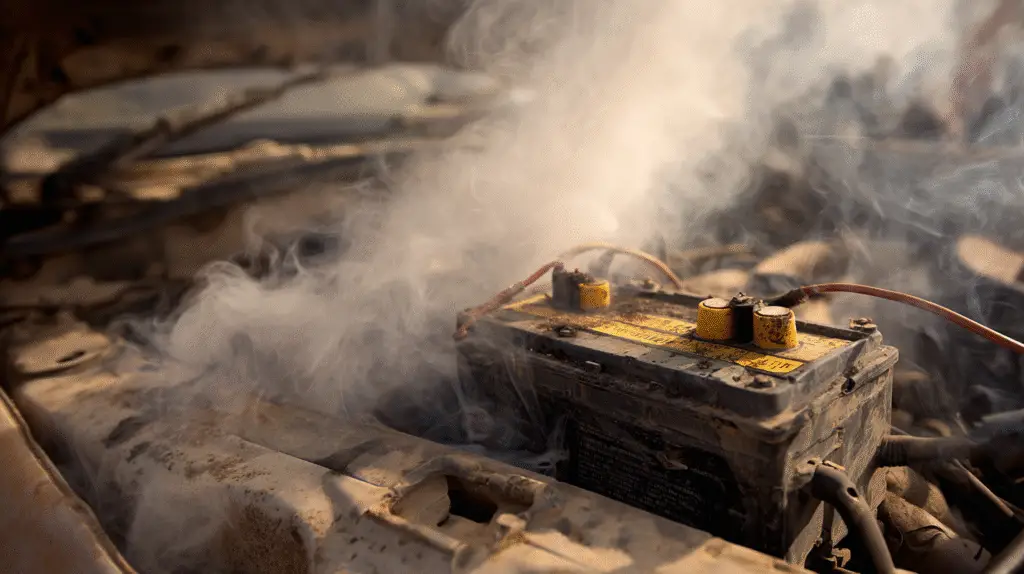
Car batteries contain sulfuric acid that can break down and release hydrogen sulfide gas, producing that distinctive rotten egg smell in your vehicle. This chemical reaction often occurs when a battery is overheating or malfunctioning, creating not just an unpleasant odor but potentially indicating a serious problem that needs attention.
How Car Batteries Can Create Sulfurous Smells
The sulfurous smell from your car battery stems from exact chemical processes happening inside. Overcharging is the primary culprit, as it heats the battery excessively and accelerates the breakdown of sulfuric acid into hydrogen sulfide gas. This process doesn’t just create the offensive rotten egg odor but also signals that your battery is under stress. Natural degradation of the sulfuric acid occurs over time, particularly in older batteries or those subjected to extreme temperature conditions. Electrical system issues like a faulty alternator or voltage regulator can force your battery to work harder than designed, leading to overheating and the subsequent release of sulfurous gases.
Distinguishing Battery Issues From Other Sulfur Sources
Locating the exact source of the sulfur smell requires a methodical approach to inspection. Check your battery for visible signs of damage, including corrosion around terminals, bulging sides, or actual acid leakage. Sulfur odors originating from your exhaust system often indicate a failing catalytic converter, which normally converts hydrogen sulfide to odorless sulfur dioxide during the exhaust process. These smells typically become more noticeable during acceleration or when the engine is under load. Fuel system problems create similar odors when fuel injectors malfunction or fuel pressure regulators fail, allowing excess fuel to enter the combustion chamber. The distinct difference is that battery-related smells tend to be strongest near the engine compartment, while exhaust or fuel system issues produce odors that may be more noticeable from the vehicle’s rear or when idling.
Failed Catalytic Converter: A Common Culprit
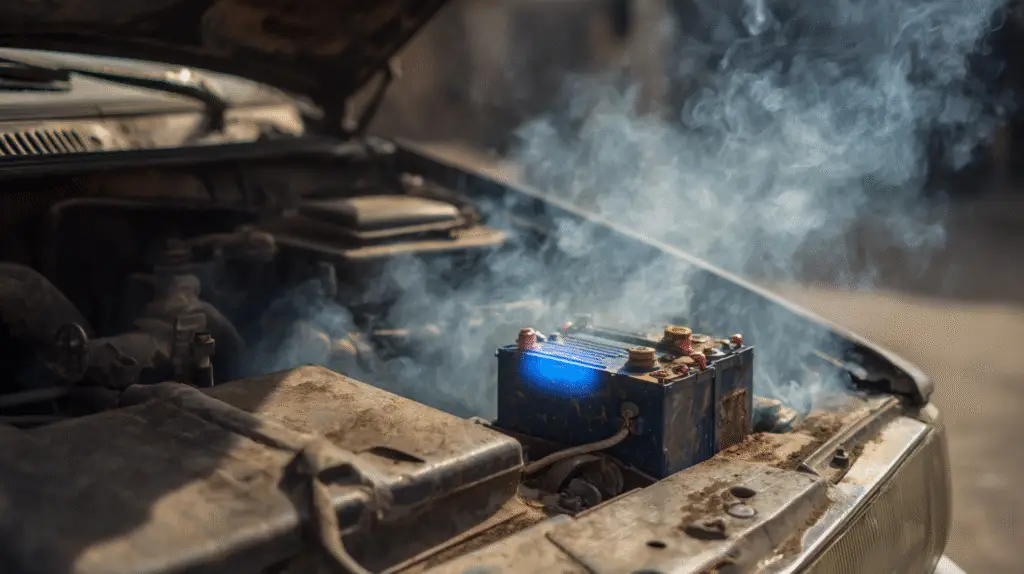
A failed catalytic converter is frequently the source of that distinctive rotten egg smell in your vehicle. This component plays a crucial role in your car’s exhaust system by converting harmful gases into less toxic substances, including hydrogen sulfide (the source of the sulfur smell) into odorless sulfur dioxide.
How to Tell If Your Catalytic Converter Is the Problem
Identifying a malfunctioning catalytic converter involves recognizing several key symptoms. The most obvious sign is the persistent sulfurous odor, particularly noticeable during acceleration or when your engine is under strain. Performance issues often accompany this smell—your car might feel sluggish, struggle to maintain speed, or experience reduced fuel efficiency. Engine misfires or rough idling can also indicate converter problems as the exhaust flow becomes restricted. Many drivers report seeing the check engine light illuminate on their dashboard when catalytic converter issues arise. Unusual rattling sounds from underneath your vehicle sometimes occur when internal components of the converter break down. The smell typically intensifies when the engine reaches operating temperature, as higher temperatures affect how the converter processes exhaust gases.
Mechanics often use diagnostic tools to check for exact error codes related to catalytic converter efficiency. These specialized tools measure the oxygen levels before and after the converter to determine if it’s functioning properly. According to automotive data, catalytic converters typically last between 70,000 and 100,000 miles under normal driving conditions before efficiency begins to decline.
Fuel System Problems That Cause Rotten Egg Smells

Fuel system malfunctions frequently contribute to that distinctive rotten egg smell permeating your vehicle. When components in your fuel delivery system fail, they can create conditions that produce hydrogen sulfide gas—the chemical compound responsible for the sulfurous odor.
High Fuel Pressure Issues
Faulty fuel pressure regulators directly contribute to rotten egg smells by delivering excessive fuel to your engine. This malfunction causes your engine to run “rich,” meaning too much gasoline enters the combustion chambers without being properly burned. Excess unburned fuel then flows into the exhaust system, overwhelming your catalytic converter. Your converter struggles to process this fuel surplus, failing to convert hydrogen sulfide into odorless sulfur dioxide as it normally would. Diagnostic tests often reveal pressure readings above manufacturer specifications when this issue occurs. Replacing the fuel pressure regulator typically costs between $150-$300 depending on your vehicle make and model.
Contaminated Fuel Concerns
Lower-quality or contaminated gasoline introduces higher sulfur content into your fuel system, increasing hydrogen sulfide production during combustion. Fuel contamination commonly occurs at gas stations with poor tank maintenance or after purchasing fuel during or immediately after tanker refills. The extra sulfur compounds in contaminated fuel create noticeable rotten egg odors even when your catalytic converter functions properly. Premium fuels generally contain fewer sulfur compounds than regular unleaded options. Adding a fuel system cleaner can sometimes help remove contaminants, though severe cases might require professional fuel system cleaning or draining the tank completely to resolve persistent odors.
How to Diagnose the Source of Rotten Egg Odors
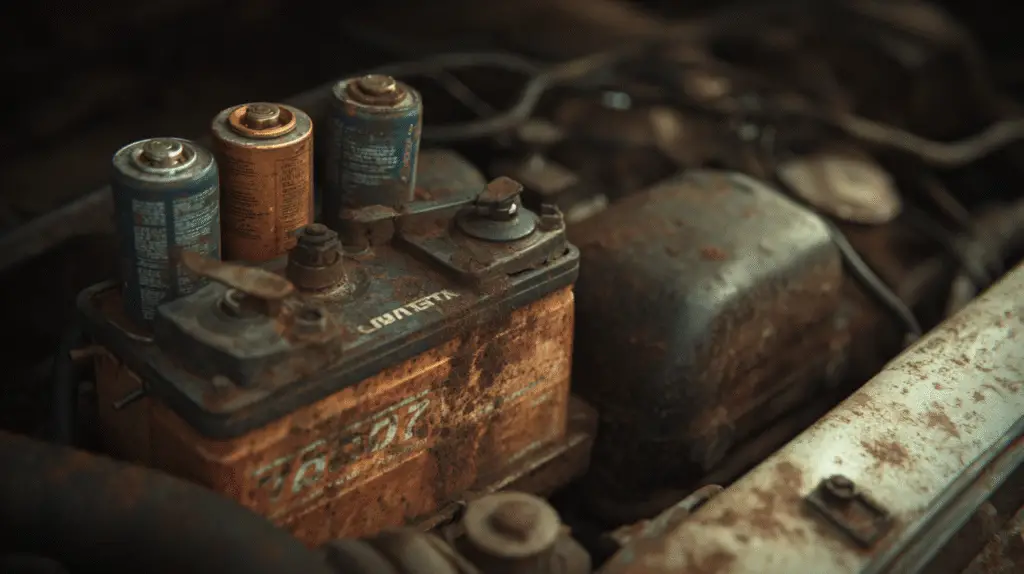
Identifying the source of rotten egg smells in your car requires a systematic approach to pinpoint whether it’s coming from your battery, catalytic converter, or another component. The hydrogen sulfide gas creating this unpleasant sulfur odor has exact origins you can track with simple diagnostic steps.
DIY Inspection Steps
Start by opening your hood and carefully smelling near the battery to detect any sulfur or rotten egg odors concentrated in this area. These localized smells often indicate battery overcharging or potential leaks of sulfuric acid. Check your exhaust system next, as rotten egg smells coming primarily from the tailpipe point to catalytic converter failure. Look at your dashboard for illuminated warning lights, particularly the check engine light, which commonly activates with catalytic converter or fuel system malfunctions. Pay attention to unusual heat emanating from underneath your vehicle or strange noises during operation, as overheating catalytic converters produce excessive temperatures and sometimes distinctive sounds. Inspect your fuel cap to ensure it’s properly sealed, as loose caps can cause improper fuel system pressure and contribute to incomplete combustion.
When to Seek Professional Help
Take your vehicle to a mechanic immediately if you notice a persistent rotten egg smell, especially when accompanied by performance issues or warning lights. Professional diagnostic scanning becomes necessary when your check engine light illuminates with emissions-related trouble codes that require specialized equipment to interpret. Battery issues demand prompt professional attention if you suspect leaks or overcharging, as these conditions pose serious safety hazards including acid exposure and potential explosion risks. Consider scheduling service when the smell intensifies during acceleration, as this exact symptom strongly indicates catalytic converter failure requiring replacement rather than cleaning. Fuel system problems producing the sulfurous odor typically need professional assessment, particularly if you’ve noticed decreased fuel efficiency or rough idling alongside the smell. Most catalytic converter issues eventually require complete replacement by a qualified technician, as temporary cleaning answers rarely resolve the underlying problem permanently.
Health and Safety Concerns of Sulfur Odors in Vehicles
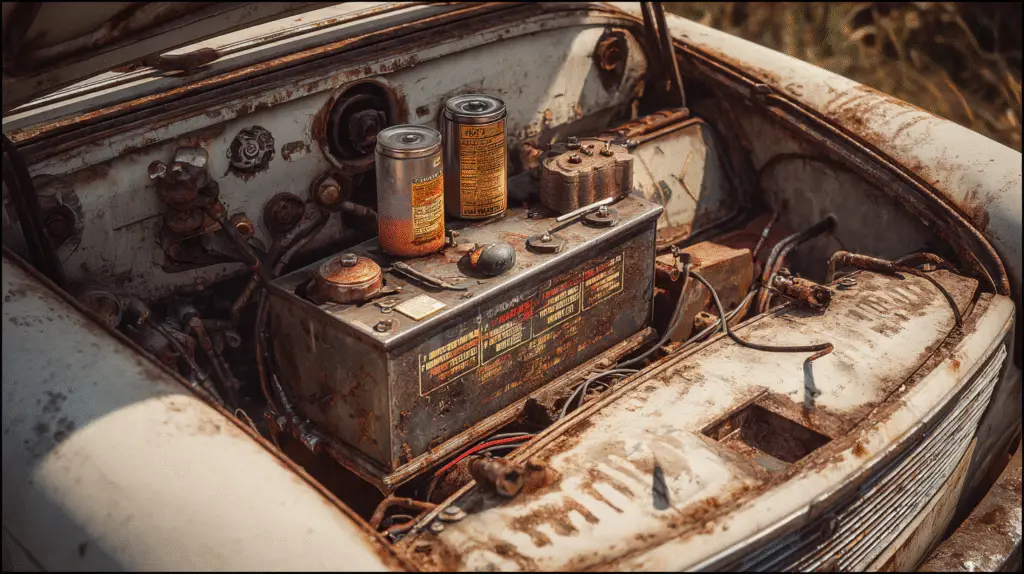
Sulfurous odors in your vehicle extend beyond mere unpleasantness, indicating potential emission system failures that release harmful gases. Hydrogen sulfide and sulfur dioxide, the primary gases associated with the rotten egg smell, can cause respiratory irritation when you’re exposed to them for extended periods. Your health faces important risks if these gases infiltrate the cabin space during your daily commute.
Battery acid leaks present a serious danger when they’re the source of sulfur smells. These leaks contain corrosive chemicals that damage vehicle components and pose direct health hazards if they come into contact with your skin or eyes. Exhaust gas infiltration into your cabin represents another critical concern, as these gases contain carbon monoxide alongside sulfur compounds.
Ignoring these warning signs increases both health and mechanical risks. Prolonged exposure to sulfurous gases can trigger headaches, nausea, and respiratory issues, particularly for passengers with asthma or other breathing conditions. The same chemical reactions causing these odors simultaneously accelerate deterioration of critical vehicle systems, potentially leading to more extensive and expensive repairs if left unaddressed.
Regular vehicle inspections serve as your first line of defense against these health concerns. Mechanics recommend immediate attention whenever you detect sulfur smells to prevent both health complications and further vehicle damage. Professional evaluation helps identify whether your battery is overcharging or your catalytic converter is failing, addressing the root cause before harmful gas exposure becomes problematic.
Solutions and Repair Options for Sulfur Smells
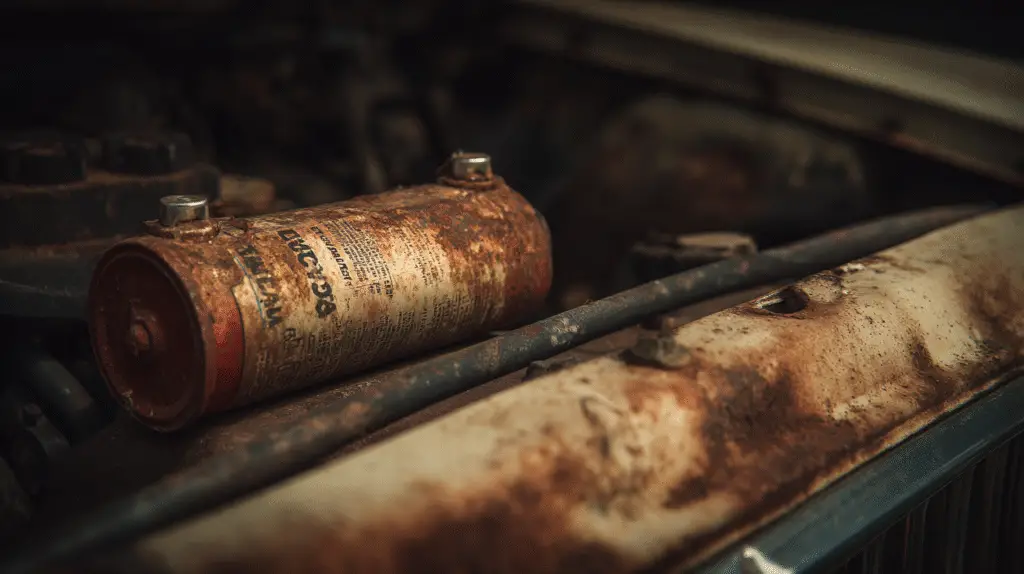
Fixing that unpleasant rotten egg smell in your car requires targeted answers based on the source of the problem. Addressing these issues promptly not only eliminates the offensive odor but also prevents potentially costly damage to your vehicle.
Battery Replacement and Maintenance
Battery issues causing sulfur smells typically require immediate attention to prevent further damage. Regular battery maintenance helps identify problems before they lead to that distinctive rotten egg odor. Check for signs of battery failure such as low voltage or visible corrosion around the terminals, which often indicate an overheating or failing battery releasing hydrogen sulfide gas. Battery cleaners effectively remove corrosion from terminals and can temporarily resolve minor issues. Severely damaged batteries releasing sulfuric acid need complete replacement, especially if they’re overcharging or consistently overheating. Most automotive batteries last 3-5 years under normal conditions, so consider replacement if yours is approaching this age range and producing odors. Professional testing at an auto parts store confirms if your battery’s condition warrants replacement rather than simple maintenance.
Catalytic Converter and Exhaust Repairs
Catalytic converter problems represent one of the most common sources of rotten egg smells in vehicles. Try using a catalytic converter cleaner as an initial solution, which may resolve minor clogging issues by breaking down deposits that prevent proper hydrogen sulfide conversion. Severe catalytic converter damage typically requires complete replacement, costing between $500-$2,500 depending on your vehicle make and model. Address underlying problems causing converter failure, such as faulty fuel injectors or poor engine performance, to prevent the new converter from failing prematurely. Exhaust system leaks allowing hydrogen sulfide to escape before proper conversion also contribute to sulfur odors and require professional sealing or component replacement. Performance issues like reduced fuel efficiency, sluggish acceleration, or engine misfires accompanying the smell strongly indicate catalytic converter problems requiring professional diagnosis with specialized equipment. Manufacturers design catalytic converters to last 70,000-100,000 miles under normal conditions, so replacement becomes increasingly likely as your vehicle ages past these milestones.
Conclusion
Don’t ignore that rotten egg smell in your car. Whether it’s coming from your battery hydrogen sulfide gas emissions a failing catalytic converter fuel system problems or contaminated engine oil immediate action is essential.
Address battery issues right away to prevent dangerous situations. Have your catalytic converter checked if you notice performance issues alongside the odor. For fuel system problems consider using premium gas and fuel system cleaners.
Your health and vehicle’s performance both depend on proper diagnosis and timely repairs. Consult a qualified mechanic if you can’t identify the source yourself as these problems rarely resolve without intervention.
Regular maintenance remains your best defense against these sulfurous odors and the potentially expensive repairs they signal.
Frequently Asked Questions
What causes a rotten egg smell in my car?
A rotten egg smell in your car typically indicates either a battery issue or a problem with the catalytic converter. This sulfurous odor comes from hydrogen sulfide gas, which can escape from an overheating battery containing sulfuric acid or from a malfunctioning catalytic converter that isn’t properly converting sulfur compounds in the exhaust.
How do I know if the smell is coming from my battery?
Battery-related sulfur smells are usually strongest near the engine compartment and may be particularly noticeable after short trips or during morning starts. Check for corrosion around battery terminals, bulging or warping of the battery case, or excessive heat coming from the battery area. Battery odors typically don’t increase during acceleration.
Could my catalytic converter be causing the smell?
Yes. A failed catalytic converter is a common source of rotten egg smell. When functioning properly, it converts hydrogen sulfide into odorless sulfur dioxide. Signs of catalytic converter issues include sulfur odors during acceleration, reduced performance, decreased fuel efficiency, engine misfires, and an illuminated check engine light.
Are fuel system problems related to the rotten egg smell?
Absolutely. Malfunctions in the fuel delivery system can produce hydrogen sulfide gas. High fuel pressure issues may cause the engine to run “rich,” overwhelming the catalytic converter with unburned fuel. Contaminated fuel with higher sulfur content can also increase hydrogen sulfide production during combustion, resulting in noticeable odors.
How dangerous is this smell to my health?
Sulfur odors indicate potential emission system failures that release harmful gases like hydrogen sulfide and sulfur dioxide, which can cause respiratory irritation with prolonged exposure. Battery acid leaks contain corrosive chemicals that can harm both your vehicle and your health. Prolonged exposure may lead to headaches, nausea, and respiratory issues.
What should I do if I smell rotten eggs in my car?
Take immediate action. Start with a DIY inspection by smelling near the battery and checking the exhaust system. Look for warning lights on your dashboard. If the smell persists, especially with performance issues, seek professional help. Mechanics can perform diagnostic scans and identify the exact cause of the problem.
How much does it cost to fix a rotten egg smell?
Costs vary depending on the source of the problem. Battery replacement typically ranges from $100-$300. Catalytic converter replacement is more expensive, usually between $500-$2,500 depending on your vehicle make and model. Fuel system repairs can range from $150 for a simple cleaning to $1,000+ for component replacements.
Can I continue driving my car if it smells like rotten eggs?
It’s not recommended. The smell indicates a potential safety hazard, particularly if it’s battery-related. Continued driving with a malfunctioning catalytic converter can lead to reduced performance, poor fuel economy, and eventually complete engine failure. Address the issue promptly to avoid more expensive repairs later.
How long do catalytic converters typically last?
Under normal driving conditions, catalytic converters typically last between 70,000 and 100,000 miles. However, they can fail prematurely due to contaminated fuel, engine performance issues, or physical damage. Regular maintenance of your vehicle’s fuel and exhaust systems can help extend the life of your catalytic converter.
Can I fix a rotten egg smell myself?
Some issues can be addressed by DIY solutions. For minor problems, you can try using battery cleaners to remove corrosion or catalytic converter cleaners for minor clogs. However, severe damage to batteries or catalytic converters typically requires professional replacement. Always address underlying issues to prevent recurrence.
Related Posts:
